Intro | 1 | 2 | 3 | 4 | 5 | 6 | 7 | 8 | 9 | 10 | 11 | 12 | 13 | 14 | 15 | 16
The Second pass - the first 5000 meters.
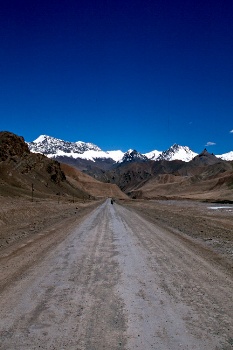 While
beginning to work my way up the 23 km steep pass, I notice the print of bicycle
tires on the gravel road. It is not a local, because they will for sure not
cycle up a pass and the gang of two it cannot be - they are long gone. I begin
to realize it must be the Japanese we met some days ago and I become obsessed
with catching- and joining up with him. I meet him one hour later and we work
our way up the pass together. The first 13 kilometers are easy, and the road
is surprisingly good. The last 10 km is a real struggle with frequent breaks
and the road turns into a bitch near the top. A friendly truck driver gives
me some bread and a soft drink and I become like a newborn. The Chinese soldiers
on the passing military trucks look very friendly and wave hands as if there
is no tomorrow. Mura arrives first on the top and we enjoy not only the incredible
view but also the fact that we have passed one of the biggest obstacles on the
route - reaching the Tibetan high plateau. It's not completely true, because
a similar pass is waiting some 93 km ahead, but who cares right now with a gigantic
downhill in front of us. I measure the altitude as 4993 meters by GPS before
we leave for the 24 km downhill to Mazar. We pass several trucks on our high
speed descent and arrive just outside the city in less than an hour, losing
more than a vertical kilometer. Mura has heard about a checkpoint just outside
Mazar, and we take a close look at the village from behind some rocks. We cannot
figure out if there is a checkpoint, and choose to cycle into the town simply
because we
While
beginning to work my way up the 23 km steep pass, I notice the print of bicycle
tires on the gravel road. It is not a local, because they will for sure not
cycle up a pass and the gang of two it cannot be - they are long gone. I begin
to realize it must be the Japanese we met some days ago and I become obsessed
with catching- and joining up with him. I meet him one hour later and we work
our way up the pass together. The first 13 kilometers are easy, and the road
is surprisingly good. The last 10 km is a real struggle with frequent breaks
and the road turns into a bitch near the top. A friendly truck driver gives
me some bread and a soft drink and I become like a newborn. The Chinese soldiers
on the passing military trucks look very friendly and wave hands as if there
is no tomorrow. Mura arrives first on the top and we enjoy not only the incredible
view but also the fact that we have passed one of the biggest obstacles on the
route - reaching the Tibetan high plateau. It's not completely true, because
a similar pass is waiting some 93 km ahead, but who cares right now with a gigantic
downhill in front of us. I measure the altitude as 4993 meters by GPS before
we leave for the 24 km downhill to Mazar. We pass several trucks on our high
speed descent and arrive just outside the city in less than an hour, losing
more than a vertical kilometer. Mura has heard about a checkpoint just outside
Mazar, and we take a close look at the village from behind some rocks. We cannot
figure out if there is a checkpoint, and choose to cycle into the town simply
because we 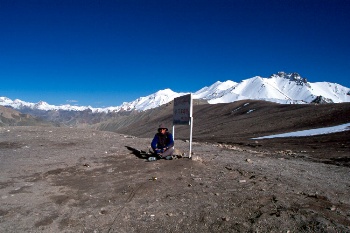 are
dead tired and hungry. It turns out that a shelter we suspected of being a checkpoint
is a restaurant and we end up eating and sleeping there. Well, we didn't sleep
much because at 12, two highly talking Tibetan truck drivers tumble inside our
room and go to sleep after half an hour of talk. I felt like I have slept for
5 minutes when another guy tumbles in at 5 and starts a huge argument with the
two, apparently because he is their boss and it seems like they not are supposed
to sleep. In the end I become really pissed off.
are
dead tired and hungry. It turns out that a shelter we suspected of being a checkpoint
is a restaurant and we end up eating and sleeping there. Well, we didn't sleep
much because at 12, two highly talking Tibetan truck drivers tumble inside our
room and go to sleep after half an hour of talk. I felt like I have slept for
5 minutes when another guy tumbles in at 5 and starts a huge argument with the
two, apparently because he is their boss and it seems like they not are supposed
to sleep. In the end I become really pissed off.
The Han-Chinese couple managing this small shelter are quite funny as we try to make our mind clear on what to eat and bring with us the next morning. This young couple must have emigrated from east China, choosing a life on the edge of eternity here in nomads land which must be one of the last frontiers in China. We turn left after a few hundred meters of cycling - the road to the right leads to the Mazar military base and the most difficult 8000 meter peak on earth, the deadly K2. Tempting to use a week on this road, but it is impossible to walk in to base camp from July to mid August because of high rivers.
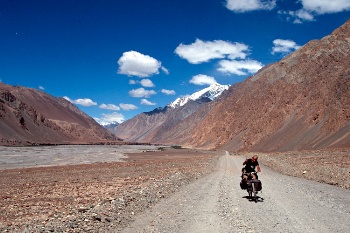 The
road becomes washboard as we cut our way through the sharp headwind and dust
from the military trucks passing us along the road. We rent a bombshelter of
a room with half the roof missing next to a roadworker house for 15 yuan each
in the evening and Mura cooks a gigantic meal of vegetables on his Whisperlite
stove and swallows it in no time. I begin to become used to the different kind
of privacy which exists here in Western China - the locals are very curious
and cannot understand why a door sometimes is closed, and I slowly accept this
two-way tourism.
The
road becomes washboard as we cut our way through the sharp headwind and dust
from the military trucks passing us along the road. We rent a bombshelter of
a room with half the roof missing next to a roadworker house for 15 yuan each
in the evening and Mura cooks a gigantic meal of vegetables on his Whisperlite
stove and swallows it in no time. I begin to become used to the different kind
of privacy which exists here in Western China - the locals are very curious
and cannot understand why a door sometimes is closed, and I slowly accept this
two-way tourism.
We start out early at
9.30 knowing that the day will be long and hard, climbing up to a 5000 meters
pass 20 km away. It quickly becomes switchback after a very steep straight road
section and to make it better, loads of military convoys make the air dusty.
Several hours later I run into a truck with civilian Chinese which has broken
down and am offered watermelon while waiting Mura to catch up. Suddenly he comes
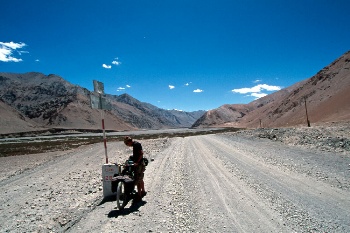 racing
past and I leave the place as sudden as I arrived. We both underestimate the
length of the pass and it takes most of the day to reach the top at 4955 meters
by GPS. I wait 20 minutes for Mura to arrive before we start the descent down
the sandy switchback road. My hydraulic disk brake works like a dream and makes
me cycle faster than I should. Suddenly the road becomes very sandy and I weave
from side to side while desperately trying to brake, but too late. Strange so
slow time goes as one flies over the handlebars and lands on the road - it takes
forever. The landing pushes all air out of my lungs, and I felt how the skin
on the left knee brutally is ripped off, while I glide down the road. Still,
I am very lucky only to get big wounds on the knee and my left elbow. Mura takes
my bike off the road and smokes a cigarette while I take care of my wounds.
We have been hoping to reach Xaidulla by the end of the day, but because of
the flat downhill slope and the crash, it is obviously not possible. Mura wants
to camp in the hilly surroundings while I want to cycle 5 km more in order to
reach a road worker house which according to my notes from a German who did
the road last year should have very friendly inhabitants.
racing
past and I leave the place as sudden as I arrived. We both underestimate the
length of the pass and it takes most of the day to reach the top at 4955 meters
by GPS. I wait 20 minutes for Mura to arrive before we start the descent down
the sandy switchback road. My hydraulic disk brake works like a dream and makes
me cycle faster than I should. Suddenly the road becomes very sandy and I weave
from side to side while desperately trying to brake, but too late. Strange so
slow time goes as one flies over the handlebars and lands on the road - it takes
forever. The landing pushes all air out of my lungs, and I felt how the skin
on the left knee brutally is ripped off, while I glide down the road. Still,
I am very lucky only to get big wounds on the knee and my left elbow. Mura takes
my bike off the road and smokes a cigarette while I take care of my wounds.
We have been hoping to reach Xaidulla by the end of the day, but because of
the flat downhill slope and the crash, it is obviously not possible. Mura wants
to camp in the hilly surroundings while I want to cycle 5 km more in order to
reach a road worker house which according to my notes from a German who did
the road last year should have very friendly inhabitants.
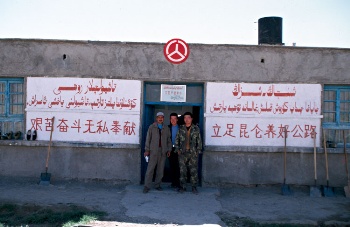 And
friendly they are, the 10 people - half Han-chinese, half Uighur. We play Chinese
chess for hours before they invite me to watch an American karate movie They've
got on laserdisk. It feels unreal. Here I sit in a movie room in the isolated
Kunlun mountains and enjoy (actually) what I have traveled thousands of kilometers
to avoid. Technological progress has even reached the most isolated mountain
areas. A Han-Chinese takes a close look at my wounds and smears antibiotic ointment
on it to prevent infection.
And
friendly they are, the 10 people - half Han-chinese, half Uighur. We play Chinese
chess for hours before they invite me to watch an American karate movie They've
got on laserdisk. It feels unreal. Here I sit in a movie room in the isolated
Kunlun mountains and enjoy (actually) what I have traveled thousands of kilometers
to avoid. Technological progress has even reached the most isolated mountain
areas. A Han-Chinese takes a close look at my wounds and smears antibiotic ointment
on it to prevent infection.
They don't want me to
pay for staying as I leave the next morning. The 23 km. to Xaidulla turns out
very sandy and the sun makes the temperature rise up to 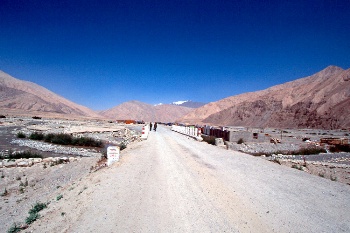 more
than 30 C. I arrive in the town a few hours later and wait for Mura to arrive.
It takes three long hours, mainly because he starts out late and has to pack
all his gear at his campsite. Still, the hours come in handy when hanging around
and a Chinese officer takes a look at my bike and points out a broken spoke
and of course I manage to puncture the inner tube during the repair. When Mura
arrives and we eat together at a local landcruiser restaurant, he suddenly declares
that this is his destination for the day. I am amazed - I've been waiting for
him to arrive and we are only in the middle of the day. But I don't want to
continue on my own and choose to stay for rest of the day. After the trip, I
come to think of the differences between him and me. While I want to race across
Tibet as fast as I can, his nature is more like taking things easy and enjoy
the trip.
more
than 30 C. I arrive in the town a few hours later and wait for Mura to arrive.
It takes three long hours, mainly because he starts out late and has to pack
all his gear at his campsite. Still, the hours come in handy when hanging around
and a Chinese officer takes a look at my bike and points out a broken spoke
and of course I manage to puncture the inner tube during the repair. When Mura
arrives and we eat together at a local landcruiser restaurant, he suddenly declares
that this is his destination for the day. I am amazed - I've been waiting for
him to arrive and we are only in the middle of the day. But I don't want to
continue on my own and choose to stay for rest of the day. After the trip, I
come to think of the differences between him and me. While I want to race across
Tibet as fast as I can, his nature is more like taking things easy and enjoy
the trip.